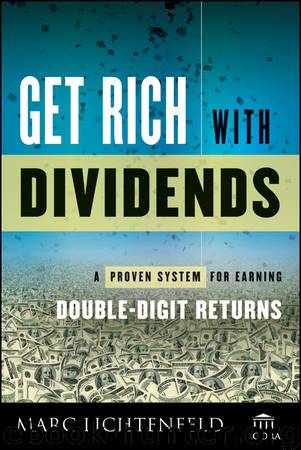Get Rich with Dividends by Marc Lichtenfeld

Author:Marc Lichtenfeld
Language: eng
Format: epub
Publisher: John Wiley & Sons, Ltd.
Published: 2012-05-24T16:00:00+00:00
BDCs
A Business Development Company (BDC) is a publicly traded private equity investment firm. Usually you need boatloads of money or connections to get into a private equity investment.
Private equity firms create funds and usually invest in early-stage start-up companies. They can be anything from a biotech company with a new technology for treating cancer to a chain of coffee houses. Some private equity companies specialize in certain sectors, such as biotech, technology, or retail; others are generalists, entertaining opportunities wherever they lie.
Why would someone invest in a private equity fund? We all know how wealthy you could have become if you had invested in Microsoft and Apple when the companies had their initial public offerings (IPOs). Imagine how rich you would have been if you had invested even before they went public.
When early-stage companies are private and raising money, they can still sell shares, just not to the public in the markets. They sell them in privately arranged transactions. These transactions may be facilitated by pretty much anyone—an investment bank, a board member, or the CEO’s mom.
These kinds of deals are usually done by knowing the right people. When looking for funding for Marc Lichtenfeld’s Authentic Italian Trattoria, I may have reached out to some well-heeled investors whom I know have funds dedicated to this type of speculation, or my mom may have mentioned it to her mahjong group and one of her friends decided to invest $100,000 with me.
When you invest in an early-stage company, you typically get a larger portion of equity than if you bought shares once the company’s stock is publicly traded. When Microsoft went public in 1986, investors who bought $100,000 worth of stock at the IPO owned 0.15% of the company. Perhaps if someone invested $100,000 in 1977, when the company was still in its early stages, he might have received 2% of the company for that $100,000 (I’m making these 1977 numbers up just to illustrate the point).
Young companies have to sell larger portions of themselves early on in order to attract investment dollars. Those equity positions can become very lucrative as a company matures and particularly if it goes public.
Sometimes these private equity firms lend money to the start-up instead of taking an equity position. For early-stage companies with little revenue, getting a business loan can be difficult, particularly now that money is tight; for this reason, the start-ups may have to go to other sources.
A private equity firm may lend money to a start-up at, let’s say, 13% annual interest, even though the standard bank business loan might be 8%. Since the start-up can’t get a bank loan, it has to pony up the higher interest rate since the risk is larger.
Each loan is structured differently, but it is common for the lender to take an equity position or take possession of collateral, such as intellectual property, product, or equipment, if the loan is not paid back.
Download
This site does not store any files on its server. We only index and link to content provided by other sites. Please contact the content providers to delete copyright contents if any and email us, we'll remove relevant links or contents immediately.
| Analysis & Strategy | Bonds |
| Commodities | Derivatives |
| Futures | Introduction |
| Mutual Funds | Online Trading |
| Options | Portfolio Management |
| Real Estate | Stocks |
Rich Dad Poor Dad by Robert T. Kiyosaki(6631)
Pioneering Portfolio Management by David F. Swensen(6300)
How To Win Friends and Influence People by Dale Carnegie(4512)
The Money Culture by Michael Lewis(4206)
The Dhandho Investor by Mohnish Pabrai(3764)
The Wisdom of Finance by Mihir Desai(3746)
Liar's Poker by Michael Lewis(3446)
Fooled by Randomness: The Hidden Role of Chance in Life and in the Markets by Nassim Nicholas Taleb(3123)
The ONE Thing by Gary Keller(3070)
Mastering Bitcoin: Programming the Open Blockchain by Andreas M. Antonopoulos(3041)
The Intelligent Investor by Benjamin Graham Jason Zweig(3039)
The Psychology of Money by Morgan Housel(3033)
Rich Dad Poor Dad: What The Rich Teach Their Kids About Money - That The Poor And Middle Class Do Not! by Robert T. Kiyosaki(2958)
Investing For Dummies by Eric Tyson(2952)
How to Day Trade for a Living: Tools, Tactics, Money Management, Discipline and Trading Psychology by Andrew Aziz(2949)
How to Win Friends and Influence People by Dale Carnegie(2913)
Market Wizards by Jack D. Schwager(2700)
How to Pay Zero Taxes, 2018 by Jeff A. Schnepper(2653)
Zero Hour by Harry S. Dent Jr. & Andrew Pancholi(2647)
